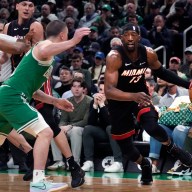LONDON – British Prime Minister Gordon Brown authorized a long-awaited inquiry into the Iraq war on Monday, but defied requests from bereaved families and campaigners to hold sessions in public.
Brown told the House of Commons that an examination of mistakes made during and after the 2003 U.S.-led invasion will begin next month, but take place entirely behind closed doors.
“Now is the right time to ensure we have a proper process in place to learn the lessons of the complex and often controversial events of the last six years,” Brown said.
Campaigners have repeatedly called for a public inquiry to scrutinize what they say are a range of errors made by Britain, the United States and other allies in prewar intelligence and planning for postwar reconstruction work.
Brown said a panel of appointed experts – not lawmakers – will conduct the inquiry, led by John Chilcott, a former senior civil servant who played a key role in the Northern Ireland peace process.
He said the panel would look closely at the build up to the Iraq invasion, how the conflict was conducted and problems with planning for reconstruction projects – seeking to draw lessons for future combat operations.
The panel itself will decide whether to address wider questions about whether Britain should have been involved at all in the Iraq invasion, Brown’s office said.
British officials said the inquiry is the first of its type by a country that joined the Iraq invasion, and will be more comprehensive than the work of the 2006 Iraq Study Group in the U.S., the bipartisan panel led by former Secretary of State James A. Baker III and former Rep. Lee Hamilton that helped chart a new course in the then-flagging war.
The war was deeply unpopular in Britain, prompting some of the country’s largest ever protest marches – including a rally which drew an estimated 2 million demonstrators to central London. Then-Prime Minister Tony Blair was badly tarnished by his decision to join the war – and widely lampooned as U.S. President George W. Bush’s poodle. But later Blair won a 2005 national election, with a reduced majority.
Brown said the inquiry will examine the background to the Iraq war from 2001, be permitted to call witnesses and have access to all government documents – including classified papers.
“No British documents and no British witness will be beyond the scope of the inquiry,” said Brown, who pledged that a final report will disclose “all but the most secret of information.”
Jonathan Powell, Blair’s chief of staff, said last year that Chilcott played a role in secret talks with Irish Republican Army dissidents that helped seal the Northern Ireland peace settlement.
Brown said that Martin Gilbert, best known as Winston Churchill’s biographer; Kenyan-born House of Lords member Usha Prashar; Lawrence Freedman, an academic Blair appointed as a government historian; and Roderick Lyne, a former British ambassador to Russia, also will serve on the panel.
The prime minister said Chilcott’s group will likely report in July 2010. Brown must call a national election by June 2010.
Critics said the public would not accept a review held in private.
“I am staggered that the prime minister is seeking to compound the error, fatal to so many of Britain’s sons and daughters, by covering up the path that led to it,” said Nick Clegg, leader of the opposition Liberal Democrats.
Rose Gentle, whose 19-year-old son Gordon was killed in Iraq in 2004, said the inquiry should have been held in public. “My family and most of the families who lost loved ones just want a simple answer to a simple question – why did we go in to Iraq in the first place?” Gentle said.
As Brown made his announcement, about 25 anti-war protesters held a demonstration outside Parliament. “The process will exonerate politicians. It will just be another bucket of whitewash,” said Lindsey German, of the Stop the War Coalition.
Britain’s six-year operation in Iraq, which ended in April, cost the lives of 179 service personnel. At the height of combat operations in March and April 2003, Britain had 46,000 troops in Iraq.
Most of the 500 troops remaining in the southern Iraqi city of Basra, where British personnel were mainly based, are due to leave by the end of July.
Two British inquiries into aspects of the decision to join the U.S.-led war already have been held.
One cleared the government of blame for the death of David Kelly, a government weapons scientist who killed himself in 2003 after he was exposed as the source of a British Broadcasting Corp. report that accused Blair’s office of “sexing up” prewar intelligence.
A separate 2004 inquiry into intelligence on Iraq also cleared Blair’s government, but criticized intelligence officials for relying on seriously flawed or unreliable sources.
















